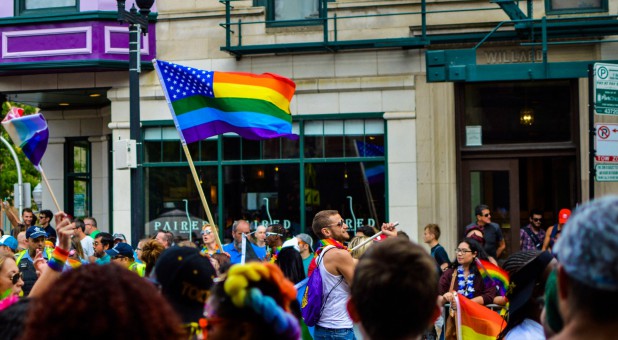Azusa Pacific University Lifts Ban on LGBT Relationships
Azusa Pacific University has lifted its ban on lesbian, gay, bisexual, transgender and queer relationships.
“We thought it was unfair to single out queer folks in same-sex romantic relationships while it is impossible to enforce or monitor [whether other students are remaining abstinent],” says Erin Green, co-executive director of Brave Commons and recent APU alumna. “Queer students are just as able to have romanticized relationships that abide by APU’s rules. The code used falsely assumed that same-sex romances always involved sexual behavior. This stigmatization causes harm to our community, especially those serious about their Christian faith.”
Green told The New York Times she identifies as a gay Christian and sees no conflict between the two labels.
The school newspaper, The Zu, reports LGBTQ-plus students met for years without university approval.
For years, LGBTQ-plus students at APU have run an underground support group called Haven. However, because they weren’t endorsed by APU as an official club, they couldn’t gather on campus or advertise their meetings.
The group met in apartments around APU because members only knew about Haven by word-of-mouth. Members of Haven were motivated to have their voices heard after an APU faculty member was the target of a hate crime on campus, where LGBTQ-plus slurs were used against him.
However, APU’s official stance maintains “any deviation from the biblical standard is an opportunity for repentance, grace, and redemption, so that as a community we might honor one another and glorify God.”
According to the university’s website, “biblical sexuality” is defined as:
- Humans, being created in the image of God, are inherently relational beings (Genesis 1:26).
- The inherent relational nature of humankind is expressed in a variety of contexts including family, marriage, work, and for Christians, the body of Christ (Hebrews 10:24-25; 1 Corinthians 12:14).
- Humans were created male and female and expressly blessed by God to be fruitful and multiply and to exercise dominion over the earth (Genesis 1:26-28).
- Sexual union is intended by God to take place only within the marriage covenant between a man and a woman (Genesis 2:18, 21-24; Hebrews 13:4), which Jesus reaffirms (Matthew 19:4-6).
- The New Testament teaches that followers of Christ are to remain celibate outside the bond of marriage. In sexual union, both body and soul are deeply impacted. A person who engages in sexual unions outside the bond of marriage sins against his or her own body, which is the temple of the Holy Spirit (1 Corinthians 6:13, 18-20).
- The sexual union within the marriage covenant between a man and a woman has been designed by God to bring them together as “one flesh,” creating a solid foundation on which to build a family (Genesis 2:18-24; Ephesians 5:31).
The lifted ban took effect this fall after the Student Government Association passed a resolution last school year to consider creating a formal option for LGBT students.
“The changes that occurred to the handbooks around sexual behavior creates one standard for all undergraduate students, as opposed to differential standards for different groups,” Associate Dean of Students Bill Fiala tells the paper. “The change that happened with the code of conduct is still in alignment with our identity as a Christian institution. The language changed, but the spirit didn’t. Our spirit is still a conservative, evangelical perspective on human sexuality.”
Private University Products and News reports multiple Christian campuses accept and affirm LGBT students, including Calvin College and Campbell University.
“You’ve got those two values,” says Mary Hulst, senior chaplain at Calvin. “We love our LGBT people. We love our church of Jesus Christ. We love Scripture. So those of us who do this work are right in the middle of that space. We are living in the tension.”
The tension is so jarring that even mainstream media outlets have picked it up, from The New York Times to NRP to The Atlantic.
“Millennials are looking at the issue of gay marriage, and more and more they are saying, ‘OK, we know the Bible talks about this, but we just don’t see this as an essential of the faith,’ ” Brad Harper tells NPR. Harper is a professor of theology and religious history at Multnomah University, an evangelical Christian institution in Portland, Oregon.






































